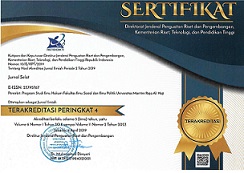Pertanggung Jawaban Pidana Terhadap Pelaku Tanpa Izin Mengumpulkan Limbah Oli Tanpa Melakukan Pengelolaan
DOI:
https://doi.org/10.31629/selat.v6i2.1066Keywords:
Criminal liability, oil waste, collect without permissionAbstract
Everyone is prohibited from collecting B3 waste, especially oil, without the provision of a Minister, governor or regent/mayor in accordance with their authority. This is regulated in article 59 paragraph (4) and criminal sanctions are contained in article 102 of the UUPPLHD and in PP article 1 paragraph 2 Government Regulation No. 18 of 1999 concerning Management of Hazardous and Toxic Waste. B3 waste especially oil can damage the environment. This research uses normative juridical methodology with reference to secondary data sources as the main legal material analyzed and arranged systematically and then draws a descriptive conclusion. Specifically B3 waste is the rest of the business and/or activity containing hazardous materials and/or toxic due to the nature and/or the concentration and / or amount, either directly or indirectly, can pollute and/or damage the environment, and/or can endanger the environment, health, the survival of humans and other living things. Oil as a dirty lubricant/oil, which by deliberately collected for resale to those who need it can damage the environment because sida from sediments dumped into the soil media can cause soil damage. The remaining oil must be processed or given to companies that can process waste so it is not dangerous. Actors can be responsible if there is an error in the guards, there is no forgiving and justifying element in the perpetrator and fulfills the subjective and objective elements of article 102 jo 59 paragraphs (4) Law Number 32 of 2009 concerning Environmental Management.
References
A. Buku
Danusaputro, Munadjat. Hukum Lingkungan dalam Pencemaran Lingkungan Melandasi Sistem Hukum Pencemaran, Buku V: Sektoral. Bandung: Bina Cipta, 1986.
Lamintang, P.A.F. Dasar-dasar Hukum Pidana Indonesai. Bandung: Citra Aditya Bakti, 1997.
Mahmud, Mulyadi & Surbakti Feri Antoni. Politik Hukum Pidana Terhadap Kejahatan Korporasi. Jakarta: Sofmedia, 2010.
Moeljatno. Perbuatan Pidana dan Pertanggung jawaban Dalam Hukum Pidana. Jakarta: Bina Aksara, 1993.
Muladi & Priyatno Dwidja. Pertanggungjawaban Pidana Korporasi. Jakarta: Kencana, 2012.
Pantja, Astawa I. Gede, and I. Gede Pantja Astawa. Dinamika Hukum dan ilmu Perundang-Undangan di Indonesia. Bandung: Alumni, 2008.
Riyanto. Limbah Bahan Berbahaya dan Beracun (Limbah B3). Yogyakarta: Deepublish, 2014.
Soemarwoto, Otto. Analisis Dampak Lingkungan. Yogyakarta: Gadjah Mada University Press, 1994.
Suparmono, Gatot. Penyelesaian Sengketa Lingkungan Hidup di Indonesia. Jakarta: Rineka Cipta, 2013.
B. Jurnal
Akmadi, Zainal & Suharno. "Efektifitas Limbah Rambut Dalam Menurunkan Kadar Minyak Oli Pada Air Limbah Bengkel." Jurnal Vokasi Kesehatan 3, no. 1 (2017).
Azteria, Veza & Jamal Efendi. "Identifikasi Keselamatan Penanganan Limbah Pelumas Pada PT. Altrak 1978 Balikpapan." Jurnal Biologi Lingkungan, Industri, Kesehatan 4, no. 1 (2017).
Utomo, Suratmin. "Bahan Berbahaya dan Beracun (B-3) dan Keberadaanya di Dalam Limbah." Konversi 1, no. 1 (2012).
C. Peraturan Perundang-undangan
Undang-Undang Nomor 32 Tahun 2009 tentang Pengelolaan dan Perlindungan Lingkungan Hidup
Peraturan Pemerintah Nomor 101 Tahun 2014 tentang Pengelolaan Limbah Berbahaya Dan Beracun.
Peraturan Pemerintah Nomor 27 tahun 2012 tentang Izin Lingkungan.
Peraturan Daerah Kota Medan Nomor 1 Tahun 2016 tetang Pengelolaan Limbah Bahan Berbahaya Dan Beracun.
Peraturan Daerah Kota Medan Nomor 13 Tahun 2003 tentang Izin Pengelolaan Dan Pemanfaatan Limbah.







